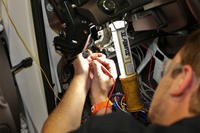You know the old saying: when given lemons, make lemonade. But what if the lemon happens to be a car you just purchased that turned out to be far more junky than you expected when you bought it? Yes, it's the dreaded lemon car, sure to drive you up the wall (not to mention drive your repair costs through the roof). What can you do to avoid purchasing one of these nefarious vehicles? Read on for some of our top tips, and you'll get out of getting saddled with a lemon.
1. Maybe it's just the car
Not all vehicles are created equal -- and some fall apart more quickly than others. When you're researching the car you're interested in buying, be sure to read reviews of the make and model at trusted resources such as Edmunds.com and Consumer Reports -- if you see too many red flags, you might be better off going with a different, more reliable set of wheels. Also check out nhtsa.dot.gov and safercar.gov, which has a treasure trove of data on recalls and safety defects for individual autos.
2. Man's best friend -- no, not your dog, your trusty mechanic
If you have a favorite auto mechanic, or at least know one you can trust, arrange for him to inspect the car you're interested in (if a dealer or seller has his own mechanic on hand to give a car the thumbs-up, be careful). It might cost you some bucks for your mechanic's time, but it's far preferrable to buying a car and finding out later that it'll cost a lot more of your mechanic's time to fix it up.
3. Just the Carfax, ma'am
Ongoing problems with a car that a dealer or seller might try to hide can show up on a carfax report, which you can buy at carfax.com. If you plan to be thorough in your auto search, go for the option that gets you five reports for $45, as opposed to one for $35. Again, it costs a bit, but it's better than getting stuck with a massive repair bill.
4. Quick checks
Give the car a going-over yourself before you commit to purchase. Here's some issues to look for that might indicate the car has been through hell and back:
- On the exterior, check to see that all body panels are original, and joined smoothly. Measure the distance between each wheel and the body of the car -- if there's a difference on any wheel, it might be an indication that heavy repairs from a collision were made. Check the suspension by leaning on each bumper and letting go -- the car should bounce gently only once or twice. Make sure all doors, windows and locks are functioning properly, and that the tread on the tires is worn evenly.
- Check for any telltale signs of damage inside -- frayed seatbelts, and missing or cracked knobs and buttons are indications of previous damage. Sagging or worn seats or pedals are signs of high mileage. Check to see that all warning lights are off. If you can smell mildew, it may indicate the car was flooded in the past.
- Under the hood, look for wet spots or evidence or corrosion. Do an oil check and make sure it's brown or black, and without grit or fine particles. If it looks milky, that's evidence of a blown head gasket. If there's a strong smell coming from the hood after you do a test drive, it might be evidence of a leak or crack.
- When you take your test drive, make sudden accelerations and stops, and strong turns, and see how the car responds. Is the steering wheel steady or is there vibrations? Listen for unusual noises, like pings or knocks.
All might not be lost. First, check lemonlawamerica.com, which provides regulations from each state on what protections and recourse you have. You can also get in touch with the National Association of Consumer Advocates (www.naca.net) if you think you've been taken for a ride by the dealer who sold the car to you.If you bought your car from a franchised dealer, you can visit the National Automotive Dealers Association's Automotive Consumer Action Program (AUTOCAP) at the Nada website or calling 800-252-6232 or visiting nada.com.
Unfortunately, if you buy from a private seller, your range of legal options may be limited, unless you have a written guarantee from the seller about the condition of the vehicle that you can use in a legal action. If you spent under $5000 on the car you may be able to make a case in small claims court -- check with your local small claims court clerk.










